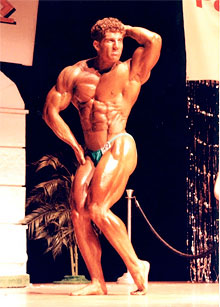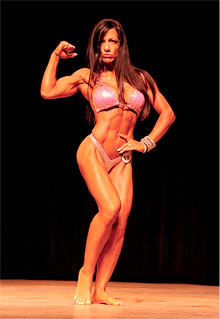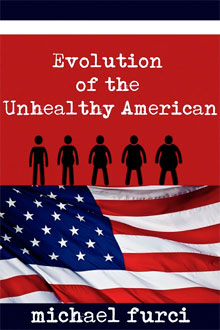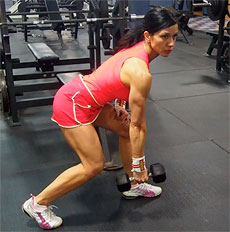
April 4, 2008
UPDATED: September 12, 2012
Furci Home / Fitness Channel / Bullz-Eye Home
Come on, you've heard them. Even people who don't work out have heard most of them. I'm talking about statements like:
- People who play sports like golf, baseball or basketball shouldn't lift weights because it will make them slow and tight.
- The thingamajig is the best exercise for giving you those washboard abs.
- You should lose the bulk of your weight before you start to weight train.
- I lift weights using high reps to shape and tone my muscles.
- Eating a diet high in fat will make me fat.
It goes on and on. It just boggles my mind that I still hear and read this stuff. As a matter of fact, I was in the gym last night going through a chest routine when I overheard a so-called personal trainer telling a woman that in order for her to get to see her abs she would have to change her routine. He continued to tell her she needed to perform at least 30 to 50 reps every set for 4 sets and use 4 different exercises for every body part. Thank God I didn't hear what he had to say about diet and cardio, because I probably would've lost it right there. I took a proactive stance, and very nicely introduced myself to the woman and told her in not so many words that the information this trainer was giving her was way off base, and that I would be glad to help her with any questions.
Unfortunately, many personal trainers, local muscle head know-it-alls, and of course the media, are the biggest perpetuators of training and nutritional myths. And what's more unfortunate, this is where most people get their information.
The hard part is that some myths have been around for so long and repeated so often, they are accepted as gospel. Because of this, dispelling these myths and getting people on the right track can sometimes be a daunting task. You'll need to open your mind and forget about all the sensational fitness and nutritional principles you've heard over the years that promise everything and deliver nothing. There are no quick fixes in fitness and nutrition.
Myth: Training your abs using the right machines or exercises will give you the washboard abs you want.
 Now, I'm only going to say this once…ready? You can do abs until you're blue in the face. I don't care if you do 1000 sit ups three times a day -- if you don't get rid of the fat covering the abdominal wall, you're not going to see diddly squat. There is no magical exercise or combination of exercises that will give you abs.
Now, I'm only going to say this once…ready? You can do abs until you're blue in the face. I don't care if you do 1000 sit ups three times a day -- if you don't get rid of the fat covering the abdominal wall, you're not going to see diddly squat. There is no magical exercise or combination of exercises that will give you abs.
There is no such thing as spot reduction, a universal principle so important, I must repeat it. There is no such thing as spot reduction. How fast and where we lose our body fat is genetically programmed, and the only way to lose body fat is to eat correctly.
A strict diet was responsible for the definition in my abs in the picture to the right. I never did any direct abdominal work.
Myth: You should lose weight before you start to train with weights or you'll just bulk up.
This is another one I've been hearing since my early days in the gym at the Lorain YMCA, which was many, many moons ago. Anyway, lifting weights is exactly what you want to do if you're overweight. As a matter of fact, if you had to choose only one type of exercise, weight training would be it by a long shot. Some of you are asking, "What about cardio?" "What about it?"
It's muscle that drives the metabolism. When we lose weight through dieting alone or with cardio, we lose both fat and muscle. The less muscle we have the slower our metabolism. The only way to build muscle, which is what you need to raise your metabolism and get lean, is through weight training.
Myth: The best way to lose fat is to do cardio.
Screw cardio!
I know that's a little harsh, but cardio is utterly overrated.
 Now don't get me wrong, walking or jogging around the block or on a treadmill is better than nothing. But I'm not, and you shouldn't be, concerned with what's better than nothing. Better than nothing doesn't even make you average. And the average in this country is incredibly unhealthy. If you're going to put the time into something, use it wisely.
Now don't get me wrong, walking or jogging around the block or on a treadmill is better than nothing. But I'm not, and you shouldn't be, concerned with what's better than nothing. Better than nothing doesn't even make you average. And the average in this country is incredibly unhealthy. If you're going to put the time into something, use it wisely.
Have you been to any one of the gyms across this country? What percentage of people who perform cardio, are lean? How many people that you see performing cardio on a regular basis make gains, and better still, keep them? More people are doing cardio today than ever, and we are still as a nation fatter than ever.
There are 3 things to keep in mind about cardio when trying to get leaner. One is that it doesn't build muscle. Two, it doesn't preserve muscle while losing weight. Both are extremely important if your goal is not only to get leaner, but to stay that way. As we lose weight the body does not discriminate where the weight comes from. As stated earlier, we lose muscle along with fat, especially on a low calorie diet. And performing cardio accentuates this phenomenon.
Lastly, unless you enjoy cardiovascular training, it's just not worth the time. The work to benefit ratio is dismal to say the least. Unless you're goal is high level endurance, and you're willing to bust your butt and perform 60 – 90 minutes of intense cardio a day, which will hinder your muscle building capacity, cardio is not worth it.
If you do nothing but diet and cardio, you may lose some weight, but your results will be less than expected. Your appearance and overall shape will stay the same. If you have excess fat around your butt and narrow shoulders, your proportion will remain. Though the trouble spots will be a little smaller, you'll also have less muscle than when you started. It's muscle that gives the "firm" appearance to body parts. Those who lose weight without weight training become smaller fat people. Inevitably, they gain the weight back, as evidence by so many yo-yo dieters out there. This is not improvement to me, and if it is to you, you're going down the wrong road.
The best and only form of exercise for reshaping, improving and maintaining your health is progressive weight training.
Myth: If you want to shape and tone your muscles you should do high reps.

nothing to do with the look
Cathy attains for her competitions.
Her definition and muscularity is due
to a diet high in protein, moderated in
saturated fat, and low in carbs. Her
workouts are intense, with an
emphasis on quality not quantity.
Catherineschaumleffel.com
There are two myths contained in the statement above. Let's take them on one at a time shall we. It's still a wide spread common misconception that certain exercises are considered shaping exercises. One of the most common is the preacher curl. It was and still is widely accepted that preacher curls help build the bottom half of the bicep. This was welcome news to those who have short bicep muscle bellies. Unfortunately, it is physiologically impossible to change the shape of any muscle on our bodies. If it were, don't you think we all would be doing it? And if we were all doing it, wouldn't our physiques look very similar?
If you have small flat glute muscles when you start training, you're going to have smaller flatter glutes than most, 20 years of training later. If you have narrow triceps they're always going to be on the narrow side. If you have high thin calf muscles you are always going to have high calf muscles that are on the thin side. This is not meant to discourage you, but to encourage realistic goals. You can always add size and a more positive appearance. But getting your muscles to change shape is simply not going to happen.
"I want to make my muscles look more tone so I'm doing more reps." "I don't want to be big I just want to be more tone." First of all, if a guy ever says that he needs to be slapped and have his estrogen levels checked. Just kidding. Very simply, performing high reps will have no noticeable effect on the amount of fat you burn.
Secondly, and more importantly, the tonus of muscle has nothing to do with its appearance. Muscle tone is the amount of tension a muscle exerts at rest.
One can appear more "cut", more "shredded", more "defined", but it is impossible to appear more tone.
Myth: I'm not sore today so I must not have had a good workout yesterday.
The fact that one is sore the following days after a workout shows they probably had a good workout. However, not being sore the days following a workout has no correlation with whether you had a good workout. The factors you should be paying attention to is the intensity level. Were your sets done with 100 percent intensity? Meaning, did you take your working sets to failure using proper form. Another factor is productivity. Did you make any gains? Did you increase in the amount of weight you used or did you increase the number of reps with a particular weight? How you felt while training is another factor. Did you feel sluggish or did you feel energized and ready to push it? Post workout soreness is just one of several symptoms of a good workout.
If any of these factors are lacking you may need to change your routine. Chances are you're over-training.
Myth: Eating a diet high in protein is unhealthy and will damage your kidneys and liver.
Thank God this one isn't quite as common as it once was, but it's such a classic I had to include it.
There is not one study to support this myth. I defy anyone to show one study that supports the myth a diet high in protein will harm the liver, kidneys or is unhealthy in any way to a healthy individual. You will find however, a mound of evidence supporting the benefits of higher protein diets.
Protein repairs and maintains everything in our bodies from hormones to muscles. Proteins are made up of building blocks called amino acids. There are nine essential amino acids. Essential meaning, we have to ingest these for survival because our bodies cannot manufacture them. Many researchers now believe we have many other amino acids that should be considered "conditionally essential," because of their significance and our inefficiency at producing them. These include: glutamine, arginine, cysteine, taurine, glycine, tyrosine and proline.

If your protein intake is low your body will get the essential aminos it needs from your muscle tissue. This is a big reason why vegetarians, especially vegans, have a much lower percentage of muscle than meat and fish eating humans on average.
The lack of quality protein makes it harder for anyone to gain muscle in the gym, let alone somebody who follows a vegetarian or vegan diet. Not only are they not getting enough protein they also lack in the quality of protein unless they supplement with quality protein powders. Vegans are extremists and there is no hope. At least a lacto vegetarian can get quality protein and supplements, i.e., protein powder, kefir, milk and cheese, from dairy products derived from grass fed livestock. Vegans must resort to combining foods and eating garbage soy products, which is very low quality.
Now for all you thin-skinned readers, I'm talking about optimizing your body's ability to get lean, healthy and more muscular. I'm not saying being a vegetarian will make you unhealthy. I'm saying it's not the most advantageous way to go. Moreover, if you're not eating whole natural animal products because of health concerns, you need to revisit the research. However, if you're not eating animal products because you're concerned for the animals' welfare, then I have to respect that.
Vegans are another story. This way of eating is unhealthy. Without modern science and supplements, a vegan could not survive. It's impossible to ingest all the essential nutrients one needs through plant sources only. This lifestyle is extremely irresponsible, flies in the face of science and physiology, and I will not condone it.
Myth: Eating more protein will make me fat.
We are simply made to eat protein. Why anyone would consciously eat a diet low in protein is beyond me. Although, with so much misinformation out there I guess it's understandable. However, not only do you need to consume protein, It needs to be high quality and in adequate amounts. I recommend 1 g/lb of body weight. However if you train with 100% intensity, which is how you should train, you need upwards of 1.5g/lb. At the very least you should consume a portion of protein with every meal. Don't worry; eating more protein will not make you fat.
Protein, in and of itself, has little to do with getting fat, and has nothing to do with being unhealthy. You see a calorie is not a calorie. A calorie of a carbohydrate does not equate to a calorie of protein when being metabolized in our bodies. Protein calories are not likely to be stored as fat when compared to carbs. This is mainly due to the fact that proteins require a lot of energy to metabolize and assimilate. And as an added bonus protein lowers the glycemic index of other foods. This helps to ensure your pancreas secretes small amounts of insulin, which is the fat storage hormone. The higher your insulin levels, the more fat you're going to store.
To put it quite simply, if you do not consume enough protein you will not only put a halt to your efforts to have a leaner more muscular body, you can actually lose some of the muscle your working so hard to get.
Myth: Strictly reducing calories is the key to losing body fat.
 One of the biggest errors one can make is eating only once or twice per day. Our bodies adapt to any stress placed upon it. Our bodies are programmed through tens of thousands of years for survival. When we restrict the amount of food we eat, our bodies will respond by reducing the rate at which we burn fat. It doesn't matter that you're eating a burger with fries and a soft drink for dinner; by not eating at regular intervals your body kicks into starvation mode and readily stores fat.
One of the biggest errors one can make is eating only once or twice per day. Our bodies adapt to any stress placed upon it. Our bodies are programmed through tens of thousands of years for survival. When we restrict the amount of food we eat, our bodies will respond by reducing the rate at which we burn fat. It doesn't matter that you're eating a burger with fries and a soft drink for dinner; by not eating at regular intervals your body kicks into starvation mode and readily stores fat.
It becomes a vicious cycle. You want to lose weight so you cut back on the amount of food, which for most means eating fewer times per day. You lose weight at first; unfortunately, it's both fat and muscle. You quickly hit a plateau and start to feel sluggish because your body responds by slowing its metabolism, an automatic survival mechanism.
And if losing muscle and feeling crappy wasn't enough, you are continuously hungry and eventually fall of the wagon. You return to your old eating habits, only now you're eating more with less muscle and a slower metabolism. Because your body is a much less efficient fat burning machine, you quickly regain all the weight you lost and eventually surpass it. You've entered the world of the Yo-Yo dieter.
What needs to be done is to eat whole nutritious meals at least 4 times per day. It's what you eat, not how much you eat. You need to establish new eating habits and this may take a few months to feel comfortable. Eating in this way will ensure a faster metabolism, higher energy levels, less hunger, and a better outlook.
To learn more about what to eat and what not to eat to be healthy, read "Evolution of the Unhealthy American," my new e-book for less than $7.00. Available at Amazon, Google Books, Smashwords, and more.
Myth: Strength training is too dangerous and will stunt the growth of children.
I have an 11 year old daughter. She has already been involved with sports for 5 years. These days if a child doesn't start playing sports in the primary grades, they are going to be behind. Parents do not hesitate to enroll their young children into sports like soccer, basketball, gymnastics, football and others. These children are placed in uncontrolled environments where there is running, tripping, colliding, changing directions at high speed, twisting and a whole host of other forces being applied to their little bodies. But God forbid you put your child on a strength training routine which is in a totally controlled environment.
Some children play 2, 3 or more sports per year. These same parents I talk to in the gym would never consider putting their child on a strength training routine. The main reasons I hear from parents is the above myth.
To the contrary of what many parents fear, numerous studies show the benefits of strength training including; increased bone density and development, injury prevention, and improved athletic performance. These far outweigh the dangers parents worry so much about. So do your kids a favor and get them interested in proper weight training early.
Myth: After 96 hours of not training, a muscle will start to lose its size and strength.
The first component of a training program that should be given consideration is training frequency. How often can, or more importantly, how often should I train per week? Optimum recovery time between training sessions is essential if one is going to continue to make progress. Training frequency, which is determined by ones recovery ability, is often a forgotten part of most training protocols.
Don't be so concerned with how many training sessions you can handle per week. Be more concerned about the optimal amount. More is not always better. There is no reason in going to the gym if you're not going to make progress. In every workout, if you trained properly and have fully recovered, you should be able to add some weight or do an extra rep.
The ability to recover from workouts is genetically predetermined. Some individuals can handle a high volume and frequency of training and others can handle only minimal amounts. You need to determine the frequency at which you should train your body parts. This is done by keeping a detailed training journal of your workouts. How do you know where to go, if you don't know where you've been?
If you aren't making progress your workout needs to be adjusted. The average individual on a 3 or 4 day split routine training with 100% intensity will need between 6 and 8 days off before training the same body part. I personally train each body part 3 times per month.
Myth: Athletes or weekend warriors who play sports like golf, baseball, boxing, soccer, hockey and basketball shouldn't lift weights because it will make them slow and tight.
Why in the world should a person who plays golf weight train? Sports involving swinging, sprinting, jumping, swimming, throwing, kicking or punching are affected by the ratio of the strength of the muscles involved in the movement to the mass of those body parts. To put it simply, a soccer player who trains properly and increases his strength 15% over a 6 month period and his mass remains relatively the same will also improve his ability to accelerate. The stronger a boxer becomes while maintaining a constant body mass, the faster and harder he'll be able to punch.
Now, as far as athletes becoming tight, research has shown that full range progressive resistance training is a great way to develop functional flexibility. Individuals who weight train properly, but don't stretch, are more flexible than individuals who don't train or stretch.
In short, as with people not involved in sports, weight training will not make athletes tight or slow; it will make them better.
Questions or comments? Send them to mike@bullz-eye.com.
You can follow us on Twitter and Facebook for content updates. Also, sign up for our email list for weekly updates and check us out on Google+ as well.














